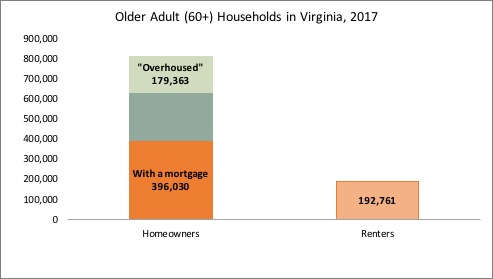Virginia’s “Overhoused” Seniors and Their Impact on the Market
August 8, 2019
By: Virginia REALTORS® Chief Economist, Lisa Sturtevant, PhD
 In many local markets across Virginia, the number of homes for sale is less than half of what it was five years ago. A lack of available inventory is making it increasingly difficult for buyers, including both first-time and move-up buyers, to find housing. One piece of the low inventory puzzle is older adults remaining in their houses longer, either for financial reasons (e.g., a lack of home equity, difficulty finding another affordable home to move into) or because of personal preferences.
In many local markets across Virginia, the number of homes for sale is less than half of what it was five years ago. A lack of available inventory is making it increasingly difficult for buyers, including both first-time and move-up buyers, to find housing. One piece of the low inventory puzzle is older adults remaining in their houses longer, either for financial reasons (e.g., a lack of home equity, difficulty finding another affordable home to move into) or because of personal preferences.
An indicator of this trend is the number of so-called “overhoused” older adults in the Commonwealth. Someone who is potentially “overhoused” is living in a home with more space than they want or desire. It is difficult to predict whether someone lives in “too much house” or simply prefers a lot of space. But as a proxy, data from the U.S. Census Bureau’s American Community Survey (ACS) was used to estimate the number of potentially “overhoused” senior households in the state.
“Overhoused” households are defined as those headed by someone age 60 or older, who owns their home free and clear, and where there are 2 more bedrooms than there are people living in the house. So, a single person living in a 3-bedroom home, or a couple living in a 4-bedroom home, would be defined as “overhoused.”
According to this analysis, nearly half a million older adult households own their home free and clear. And among those, about 180,000 are living in homes that are “too big” for them, by this definition. Therefore, about 43% of older adult homeowners who own their home free and clear are “overhoused” in Virginia. This includes more than 110,000 older adults living alone in homes that have 3 or more bedrooms, and 66,000 older couples living in homes with 4 or more bedrooms.
The places where seniors are most likely to be “overhoused” are in Fairfax and Chesterfield counties. For example, in the McLean, Vienna, and Fair Oaks areas of Fairfax County, nearly two-thirds of seniors who own their homes free and clear are “overhoused.” The share is about the same for older adult homeowners in eastern Chesterfield County.
Many of these older adult homeowners who own their homes outright, of course, prefer to stay in their larger homes and would balk at being called “overhoused.” They may want the extra bedrooms for when the kids come home from college, when visitors come in from out of town, or to set up as a home office. However, some older homeowners do live in a home that is bigger than they want, and they might be staying because of a lack of smaller home choices. This lack of housing choices—resulting from relatively low levels of new home construction since the recession and local obstacles to building smaller homes—creates a bottleneck in some housing markets, limiting inventory for new and move-up buyers, and reducing choices for older homeowners.
You might also like…
Midway Through 2024, Virginia Home Sales Activity Slightly Outpacing Last Year
By Robin Spensieri - July 24, 2024
According to the June 2024 Virginia Home Sales Report released by Virginia REALTORS®, there were 10,018 homes sold across the commonwealth last month. This is 974 fewer sales… Read More
Three Multifamily Market Trends from the Second Quarter of 2024
By Sejal Naik - July 16, 2024
Each quarter, through its Multifamily Market report, the research team at Virginia REALTORS® analyzes the trends and changes in the multifamily market. Here, we share the key highlights… Read More
Takeaways From the JCHS 2024 State of the Nation’s Housing
By Dominique Fair - July 15, 2024
The Joint Center for Housing Studies from Harvard University released this year’s State of the Nation’s Housing report highlighting the impact today’s market is having on both homeowners… Read More